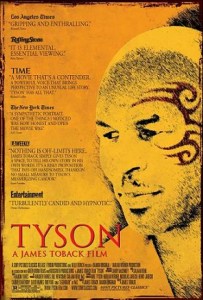 For a documentary that’s only playing at three theaters in Manhattan, “Tyson†is getting more attention than its makers probably thought it would. It’s actually kind of interesting to hear people talk about it – instead of discussing the highlights of Mike Tyson’s long career, everyone focuses on how the film approaches his life story. It uses footage that lots of people have already seen (boxing fans have probably seen it many times, in fact), but it also includes some new and revealing interviews, ones that see through the spectacle of Tyson’s career and examines an ordinary guy as he reflects on his past. It isn’t always flattering, but the truth never is.
For a documentary that’s only playing at three theaters in Manhattan, “Tyson†is getting more attention than its makers probably thought it would. It’s actually kind of interesting to hear people talk about it – instead of discussing the highlights of Mike Tyson’s long career, everyone focuses on how the film approaches his life story. It uses footage that lots of people have already seen (boxing fans have probably seen it many times, in fact), but it also includes some new and revealing interviews, ones that see through the spectacle of Tyson’s career and examines an ordinary guy as he reflects on his past. It isn’t always flattering, but the truth never is.
Even people who don’t follow boxing know all about Tyson: How he reportedly beat Robin Givens during their short marriage, how he disqualified himself in a fight by biting Evander Holyfield, how he got a tattoo on his face that made him look even scarier. Not only does “Tyson†approach everything with sober clarity, but it also gives him a chance to reflect on what he has done, to define himself after years of listening to the world do it for him.
We’ve seen Tyson put his opponents in a world of pain, but the film is more interested in the kind of pain that he feels. The memories Tyson has of his father are fuzzy and remote, and he even admits that he never knew for sure who he was. That might explain the bond he forged with trainer Cus D’Amato, who he claims saved him from selling dope on the streets of New York. We sense that when D’Amato passed, Tyson lost more than a trainer.
The film doesn’t have any objectivity, nor does it pretend to. This is an opportunity for Tyson to express himself, to let everyone know who they’ve been talking about all these years. Tyson doesn’t deny the fact that he has hurt lots of people, but he also calls attention to how many people have hurt him back. He says that Desiree Washington’s charge against him for rape was a lie, and that he lost faith in the legal system during his three-year sentence in prison. He also says that boxing promoter Don King took his money, which led to the violent confrontation that ended their partnership. King’s detractors might argue that he probably had it coming.
Material like this is bound to make for an interesting movie, but the appeal of “Tyson†goes beyond the subject matter. The movie works because it allows its audience to connect with Tyson, to understand the events in his life that made him who he is. It explores the life of one of the most popular people of our time, only to find a person who’s living in the shadow of his own image. It’s hard to tell if this movie is compromising the truth, but it’s no farther from the truth than the way that many people feel about him. Only he knows for sure which one is closer to the real thing.

Leave a Reply